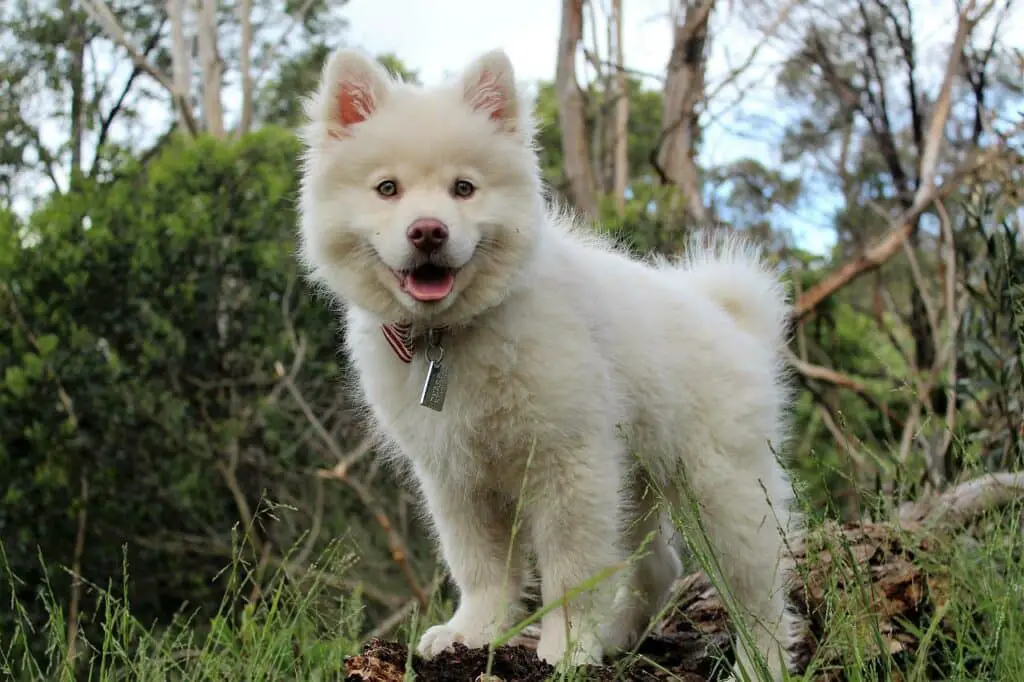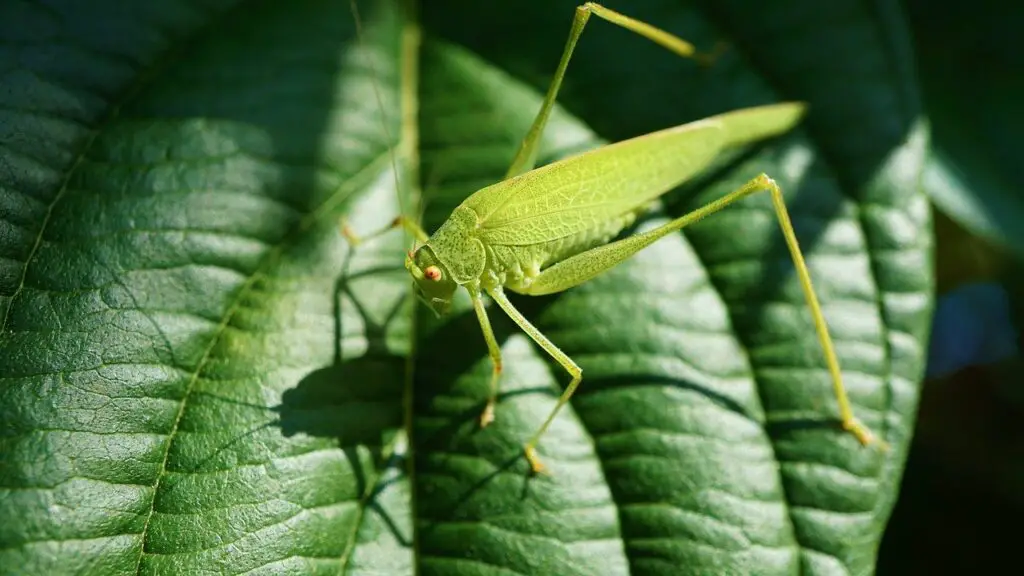Maybe your pooch loves to chase grasshoppers and munch on them.
The pursuit of, hunting for, and sometimes killing of insects is a widespread activity among dogs since they are drawn to movement.
However, there is a downside to this seemingly innocent activity.
Some insects could have some possibly dangerous components that could harm your pup.
So, can dogs eat grasshoppers?
Yes, grasshoppers are a healthy treat for dogs.
They contain various nutrients that dogs need.
For instance, protein, calcium, and some essential vitamins make them suitable for your dog to eat.
However, if your dog chows down on grasshoppers all day, he may suffer from serious health complications.
This article will explore whether dogs can consume grasshoppers.
It will also provide information on the effects of feeding these insects to your dogs and other aspects.

Are Grasshoppers Safe for Dogs to Eat?
Yes, but only in moderation.
Grasshoppers are a good source of protein and can help maintain your dog’s health.
They’re also a good source of iron, which helps prevent anemia in dogs.
However, keep an eye on how much you feed your dog at one time because they can cause stomach issues.
Grasshoppers tend to be high in fat.
The fat they get doesn’t necessarily pose a problem for your dog – just make sure they don’t consume too much of it.
If you notice that your dog has diarrhea after eating grasshoppers, stop feeding them immediately and consult with a veterinarian.

How Will My Dog React If He Eats a Grasshopper?
An occasional grasshopper snack isn’t a problem, but anything more than that may cause concern.
Grasshoppers contain protein that can lead to blockages.
Your dog may experience blockages after eating many grasshoppers since they can get caught in their intestines and prevent waste from passing.
Grasshoppers also harbor parasites like roundworms and hookworms, which often spread to pets through uncooked meat or insect consumption.
These parasites can cause serious health problems if transferred to your dog.
Moreover, eating grasshoppers poisoned by pesticides can cause secondary poisoning in dogs.
Watch your dog’s behavior for a few days after eating grasshoppers, just in case anything changes with his appetite or stool output.
If he starts showing symptoms of illness, contact your vet immediately.
A vet will be able to administer intravenous fluids (IVs) and make sure your dog is hydrated before anything else happens.
The vet may also need to give your dog an anti-parasitic medication if parasites are present in their system.
They may also recommend keeping your dog from eating any other insects for at least a week after this incident occurs to avoid further health problems.
When a Dog Eats a Grasshopper, Can it Die?
Few dogs have severe reactions to a single grasshopper or other items.
Nonetheless, if your pooch eats multiple grasshoppers at once, he could suffer serious health problems.
The most significant risk to dogs eating grasshoppers is gastrointestinal symptoms due to an allergic reaction.
There are several ways in which a dog might react to a grasshopper.
Some signs that might indicate that your dog has eaten many grasshoppers include vomiting, diarrhea, itching, and hives.
If you notice any of these symptoms, take them to the vet immediately to get the treatment they need before things get worse.
Before allowing your dog to eat an insect, consult your vet about what’s best for them if they have allergies or are pregnant.
Are Grasshoppers Harmful To Dogs?
Grasshoppers aren’t harmful to dogs, but they can cause problems if your dog overeats them.
For instance, if your dog eats grasshoppers, it can contract roundworms and parasites.
Roundworms are parasites that live in animals’ intestines.
If your dog becomes infected, these parasites may cause severe disease.
Injuries to the digestive tract can also occur after eating many grasshoppers.
If your dog eats a pesticide-free grasshopper, it may help improve their digestion by adding protein to their diet.
However, if he eats a pesticide-treated grasshopper or gets poisoned by pesticides or contaminated water, you might have to take them to the vet for treatment.
Many grasshopper species can cause the same illness in dogs as they cause in humans, like salmonellosis.
Dogs can contract salmonellosis from ingesting an insect that has been infected with the bacteria Salmonella typhimurium.
It happens when he consumes uncooked or undercooked meat or eggs contaminated with the bacteria.
The symptoms of salmonellosis in dogs include vomiting and diarrhea, which may be bloody, lethargy, fever, and loss of appetite.
If your dog displays these signs after being exposed to grasshoppers, call your vet right away so they can diagnose and treat the condition appropriately.
Can Puppies Eat Grasshoppers?
Puppies can eat grasshoppers if they’re healthy and well-fed.
However, it should only be in moderation.
Grasshoppers have an exoskeleton (or external covering) that protects their bodies from predators and helps them move around.
As puppies cannot digest chitin found in exoskeletons, they could get upset stomachs or even die if they eat too many grasshoppers.
Grasshoppers are high in protein and low in fat.
Thus, they make a good snack for your puppy.
Nevertheless, be wary of giving your puppy grasshoppers that are too large or too many at once.
Too much protein or fat can cause diarrhea or vomiting, which can lead to dehydration.
So if you decide to feed your dog grasshoppers, make sure you keep an eye on him afterward to ensure he’s not having any trouble digesting the bugs.
If you see your puppy eating grasshoppers regularly, limit their access to them until they are fully grown.
So how do you know how many grasshoppers your puppy should eat?
It depends on their size and age:
Small puppies: 1-2 per day
Bigger puppies: 3-4 per day
Final Word
Grasshoppers are safe to feed to dogs.
However, these insects should only be given as treats, and your dog should consume them sparingly.
After all, there are plenty of other options that your dog will love as much or more than grasshoppers.
Grasshoppers may contain protein, but they also have chitin.
When dogs eat grasshoppers high in chitin, they can cause serious digestive problems, including diarrhea, vomiting, and gas.
Thus, if you love feeding bugs to your pup, be careful with grasshoppers.
A new diet may pose a risk for stomach upsets and diarrhea.
- What Dog Breeds Have Pink Skin? - March 24, 2023
- What Are the Most Inspiring Dog Breeding Quotes? - March 20, 2023
- Can Pheromone Spray Help Improve Dog Breeding Results? - March 19, 2023








